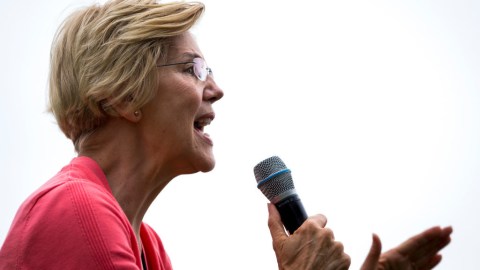Elizabeth Warren: Boost Social Security by taxing the richest 2%

Boston Globe / Getty
- Warren published a Medium post on Thursday outlining a plan to increase Social Security benefits by $200 per month, if she's elected president.
- Social Security contributions are capped for Americans who make $132,900 or more per year. Warren wants to scrap that and impose new contribution requirements.
- Left unchanged, Social Security will run out of its $2.9 trillion reserve fund by 2035, according to recent estimates.
Sen. Elizabeth Warren (D-Mass.) said Thursday that she wants to boost Social Security payments by $200 per month for every beneficiary, and to pay for it by raising taxes on the richest 2 percent of Americans.
In a Medium post, Warren said it’s becoming increasingly difficult for Americans to save for a decent retirement, with some 45 percent of unmarried seniors currently relying on Social Security for 90 percent of their income. That means many seniors are surviving on less than $20,000 per year, considering the average annual Social Security payout is $16,248 a year.
“For someone who worked their entire adult life at an average wage and retired this year at the age of 66, Social Security will replace just 41 percent of what they used to make,” Warren wrote. “That’s well short of the 70 percent many financial advisers recommend for a decent retirement — one that allows you to keep living in your home, go to a doctor when you’re sick, and get the prescription drugs you need.”
Currently, 12.4 percent of all wages from American workers goes to Social Security through the Federal Insurance Contributions Act, and that 12.4 percent is split equally between employees and employers. So, a typical worker pays 6.2 percent of their income to Social Security. But the laws are different for richer Americans: If you make, say, $1,000,000 per year, you only have to contribute 6.2 percent of your first $132,900 to Social Security.
Warren wants to change that by asking the richest Americans to, as she put it, contribute a “fair share.” That means imposing a 14.8 Social Security “contribution requirement on individual wages above $250,000 — affecting less than the top 2 precent of earners — split equally between employees and employers at 7.4 percent each.” Warren wrote that her plan would close “the so-called “Gingrich-Edwards” loophole to ensure that self-employed workers can’t easily reclassify income to avoid making Social Security contributions.”
Warren would also require individuals making more than $200,000 annually, and families making more than $400,000, to contribute to Social Security 14.8 percent of any net investment income they make in a given year. The ultimate result, Warren wrote, would be that all Social Security beneficiaries would receive $2,400 per year.
“It’s time Washington stopped trying to slash Social Security benefits for people who’ve earned them,” she wrote. “It’s time to expand Social Security.”
But would Warren’s plan work as advertised? According to an independent analysis from Moody’s Analytics, the general answer seems to be yes. The analysis found that the plan would:
- Immediately lift an estimated 4.9 million seniors out of poverty, cutting the senior poverty rate by 68 percent.
- Produce a “much more progressive Social Security system” by raising contribution requirements only on very high earners and increasing average benefits by nearly 25 percent for those in the bottom half of the income distribution, as compared to less than 5 percent for people in the top 10 percent of the distribution.
- Increase economic growth in the long term and reduces the deficit by more than $1 trillion over the next 10 years.
Sen. Phil Gramm (R-Tex.) criticized Warren’s plan for threatening to hurt the pension funds of millions of seniors, who might be relatively rich but are just “bit players in American capitalism,” he told Fox News.
Sen. Bernie Sanders (D-VT) and Rep. John B. Larson (D-Conn.) have also recently proposed plans to expand Social Security: the Social Security Expansion Act and the Social Security 2100 Act, respectively. All three proposals call for different benefit increases and timelines, but Warren’s seems to call for the biggest across-the-board increase.
Left unchanged, Social Security will run out of its $2.9 trillion reserve fund by 2035, according to recent estimates.





